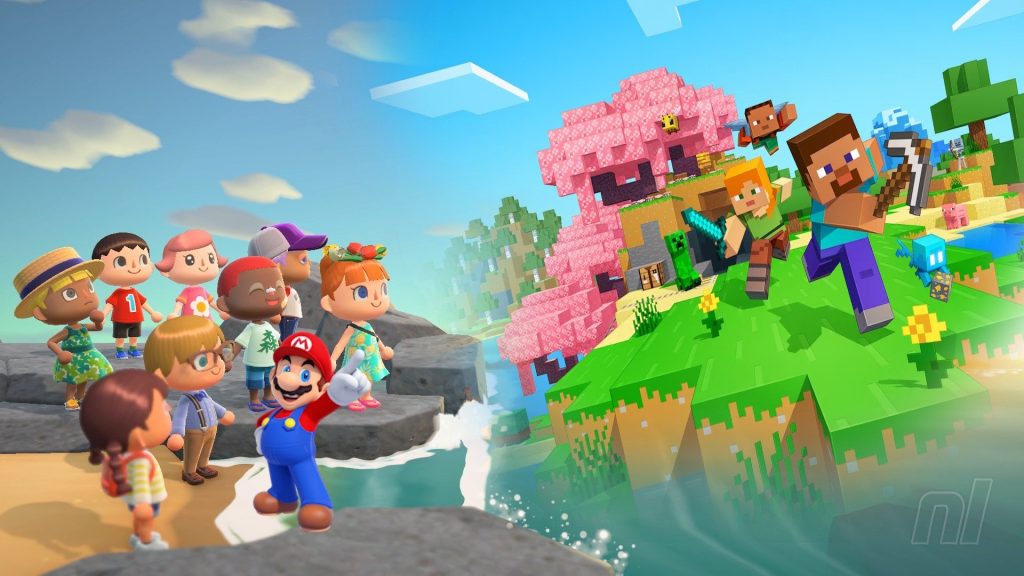In a fascinating survey conducted by the Japanese variety show Ariyoshiiieeeee! – Oh yeah! Wanna play games at your place now?, the favorite video games of the Japanese people have been revealed, showcasing a blend of iconic classics and modern hits. Surprisingly, despite the strong competition from perennial favorites, none of the usual suspects like Mario or Pokémon secured the top position. Instead, the crown went to a game that has transcended its status as a mere video game, evolving into a cultural phenomenon: Minecraft.
The Survey Details
This survey polled 3,000 individuals across Japan, and its results highlight a diverse range of gaming preferences. Notably, Minecraft topped the list, followed by Super Mario Bros. securing the second spot, and Animal Crossing: New Horizons claiming third. Participants were asked to name their five favorite games, and the votes were aggregated to create a comprehensive ranking. This method offers a clearer picture of the gaming landscape in Japan as it encompasses a wide demographic.
Decoding the Popularity of Minecraft
The selection of Minecraft as Japan’s favorite game could be attributed to several factors. First, Minecraft’s global appeal cannot be understated; it has sold over 200 million copies worldwide, making it one of the best-selling video games of all time. According to a recent report by Statista, the game’s expansive world-building mechanics allow players to not only engage in gameplay but also to express creativity, socialize, and collaborate in unique ways. The show’s host noted, “Minecraft is not just a game, but a platform,” emphasizing its role as a social medium for younger audiences.
This aligns with current trends, where gaming is increasingly viewed as a means of communication rather than just entertainment. As video gaming habits evolve, young people find themselves engaging in these platforms not just for the gameplay, but also for connection and community.
Top Games and Rankings
The list of Japan’s top games is a testament to the country’s rich gaming history and culture. Following the top three, other notable mentions in the top ten include:
- Dragon Quest III: The Seeds of Salvation – 4th
- Fortnite – 5th
- Splatoon 3 – 6th
- Super Smash Bros. Ultimate – 7th
- Splatoon 2 – 8th
- The Legend of Zelda: Breath of the Wild – 9th
- Dragon Quest – 10th
In this diverse lineup, classic franchises such as Dragon Quest and Zelda stand alongside contemporary titles like Fortnite and Splatoon, highlighting the cross-generational appeal of video games. Interestingly, while many Western games have gained traction in Japan, the list remains predominantly filled with homegrown titles, showcasing the strength of Japan’s gaming industry.
Insights Based on Age Demographics
The survey further broke down preferences by age group, revealing intriguing insights into gaming habits across different generations. Among teens, Minecraft unsurprisingly took the top spot, followed by Fortnite and Splatoon 3. For those in their 20s, Pokémon Diamond & Pearl lead, with Minecraft still managing to secure a respectable 8th place.
For the 30-something demographic, nostalgia reigns supreme with Pokémon Red & Green leading the pack, indicative of the early era of Pokémon’s influence on many players’ formative years. Not to be overlooked, older age groups also reflected a strong preference for classic titles, with Dragon Quest III and Super Mario Bros. dominating the rankings for the 40s and 50s age brackets, respectively.
The Broader Impact of the Survey
While the survey only sampled a small population, it provides valuable insights into the current cultural zeitgeist surrounding video games in Japan. It also complements findings by Nikkei, which has tracked the gender demographics and average player ages of different series. This ongoing research indicates a dynamic shift in gaming culture, reflecting broader societal changes regarding entertainment consumption.
As gaming continues to evolve, the preferences of players in Japan illustrate how deeply ingrained video games have become in social interactions and cultural expression. With these trends, it will be fascinating to see how future surveys reflect the shifting landscape of gaming preferences and the potential emergence of new favorites as technology advances.
Are you surprised by any of the results from this survey? Share your thoughts in the comments below!

